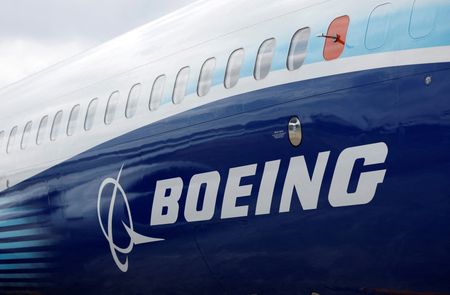By Allison Lampert, Matt Tracy and Shankar Ramakrishnan
(Reuters) -Boeing on Monday tapped debt markets to raise $10 billion, after the U.S. planemaker burned $3.93 billion in free cash during the first quarter as production of its best-selling jet declined, sources familiar with the matter said.
Boeing shares rose 3.4% after the successful sale. Ratings agencies last week slashed the outlook on Boeing’s credit to just above “junk” status. On Monday, both assigned ratings nearing junk to Boeing’s new senior unsecured notes, with S&P assigning a BBB- rating and Moody’s a Baa3 rating.
Boeing has been dealing with heightened regulatory scrutiny and other fallout from a midair blowout of a cabin panel door plug on a nearly new 737 MAX 9 in January. The planemaker is carrying the burden of multiple sequential crises from deadly crashes of two 737 MAX jets to the deep slump in travel during the pandemic.
Now a 737 MAX production shock first reported by Reuters has weakened its balance sheet and left it under a cumulative debt pile.
Investors and analysts had predicted Boeing would tap bond markets to get ahead of more than $12 billion in combined debt coming due in 2025 and 2026.
At the same time, U.S. fixed income markets have seen a huge supply rush of new bonds in recent months as companies looked to capitalize on relentless demand from investors seeking to lock in higher yields in a year when the Federal Reserve is expected to start cutting interest rates.
Moody’s said the rating reflects Boeing’s still-strong business profile, which continues to mitigate ongoing weak performance in commercial aircraft, although headwinds surrounding the division could persist through 2026.
Boeing will use the bond proceeds to boost liquidity ahead of maturities on its existing debt load, including $4.3 billion in 2025, S&P wrote on Monday.
S&P also said Boeing is in discussions to potentially acquire Spirit AeroSystems Inc in a possible debt-financed transaction for an estimated purchase price of about $4 billion.
The deal’s bookrunners leading the bond sale include Bank of America, Citi, JPMorgan and Wells Fargo, according to the deal’s term sheet.
Boeing priced bonds that have maturities ranging from three to 40 years, according to two investors. Strong demand during the sales period allowed Boeing to reduce the amount of concession offered, the investors and one banking source said.
The five-year, seven-year and 10-year bonds priced 35 basis points tighter than initial talks, while the 30- and 40-year bonds priced 40 bps tighter, according to the investors.
The sharp tightening of spreads is reflective of overwhelming demand for the bonds, with final order books totaling $71.35 billion, two bank syndicate sources said.
“I think the demand was due largely to the fact that the company hasn’t issued in a while,” one of the investors said. “It’s a little chalky but bonds are cheap. Boeing’s still in a good position and has strong orders.”
Boeing declined to comment, but pointed to remarks from Chief Financial Officer Brian West during the company’s earnings last week, saying the company was committed to managing its balance sheet prudently, prioritizing its investment-grade rating and helping stabilize the factory and supply chain.
(Reporting By Allison Lampert in Montreal and Matt Tracy in Washington; Additional reporting by Shivansh Tiwary and Shankar Ramakrishnan; Editing by Chris Sanders, Jonathan Oatis, Mark Porter and David Gregorio)






